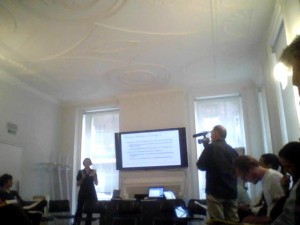Jon Leydens, Juan Lucena, and Jen Schneider presented a session with the goal of developing a workshop for teaching engineering faculty about social justice. They piloted part of the workshop in order to observe the group’s discussion of the material.
They presented six mindsets identified by Riley (Engineering and Social Justice, Morgan and Claypool, 2008) in her analysis of engineering culture as exemplified in jokes told within the profession about the profession:
o Positivist epistemology / Myth of Objectivity
o Commitment to Problem Solving /Reductionism
o Desire to Help/Persistence
o Centrality of Military/Corporate Orgs
o Narrow Technical Focus/Lack of Other skills
o Uncritical Acceptance of Authority
While Riley argues that these mindsets ought not to be thought of “engineering mindsets” per se, they are clearly present among some engineering students and practicing engineers. Leydens, Lucena, and Schneider posited that these mindsets may present barriers to teaching engineering faculty about social justice, particularly related to four elements of social justice education proposed for engineering faculty:
o Awareness and dismantling of privilege
o Fostering empathy
o Integrating personal and professional selves
o Incorporating critical pedagogy and other social justice interventions in the classroom
During the session three groups were asked to consider how two of the mindsets identified by Riley act as barriers to each of the four social justice education goals identified by Leydens, Lucena, and Schneider. While the groups didn’t have time to complete the task, and some conversation did not necessarily answer the question prompts directly, the report below captures some of the highlights from each group’s conversation.
Group 1: Positivism/Objectivity and Problem Solving/Reductionism
How to break down privilege: In Columbia, poverty is visible, and being in university at all represents economic privilege. In the US, people tend to believe what they have achieved is based on merit not privilege. So there are different challenges in different contexts. One solution for a workshop with professors is to look at their history and ask them where in their journey they benefited from privilege.
How to foster empathy: Don’t challenge neutrality of technology, but elicit what is bad and good about a particular technology. Now technology is no longer neutral.
How to promote integration: Present case studies with an emphasis on social and technical problems. Relate to different content subjects.
How to incorporate critical pedagogy: Reward structure has to change. Meet faculty interests.
Group 2: Desire to Help/Persistence and Centrality of Military/Corporate Orgs
Desire to Help/Persistence
Privilege:
Have semi-structured discussion looking at similarities and differences between privileged and non-privileged groups. Role-play and simulation activities. Concern that faculty would have difficulty in seeing the connection between role-play and reality. Faculty could do energy audit or ecological footprint. Real data on graph, then compare to a different setting to highlight difference
Integration:
Isn’t it socially unjust for a professor to lecture values as if their view is the only right one? Students need a chance to form their own opinions and voice them, not just learn facts. Encourage roundtable discussions, sharing in classroom.
Military/Corporate
Privilege: Explore possible places engineers can work, generate alternatives to military/corporate. Government/NGO/entrepreneurial alumni/ae come back and talk about what they use from a course and how social justice issues come up in their lives. Home vs. work lives – ask professors whether they act the same or not at home vs. at work?
Where there are global compact agreements it is important to pay critical attention to whether these are surface agreements that represent lip service or whether agreements are substantively reflected in actual practice.
Group 3: Narrow Technical Focus/Lack of Other skills and Uncritical Acceptance of Authority
For all learning elements: Role-play. But it might be challenging to do this in a group of faculty or in a professional setting because it may be outside their comfort zone. Another idea is to have a quiz like in a magazine with point tallies that tell you something about your values. Or create/design scenarios, then ask faculty to think about their values and how they would apply in a given scenario.
This group found it problematic to have been presented with the mindsets as barriers to the four educational goals. They wanted to address or undo the mindsets rather than potentially reinforce them or work around them in trying to meet the four educational goals.

